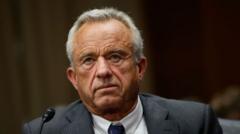Robert F. Kennedy Jr. officially becomes the U.S. Secretary of Health and Human Services despite bipartisan concerns about his credibility regarding vaccines and public health policies.
RFK Jr Sworn in as Controversial U.S. Health Secretary

RFK Jr Sworn in as Controversial U.S. Health Secretary
Former President Trump’s cabinet pick faces skepticism over health views
Six hours ago, Robert F. Kennedy Jr. has been sworn in as the new U.S. Secretary of Health and Human Services, marking a controversial addition to President Donald Trump's cabinet. With a breadth of authority over key health agencies including the CDC, FDA, and NIH, Kennedy's role encompasses public health, food safety, and vaccine policies, a domain in which he has drawn sharp criticism for his previous remarks.
Kennedy's confirmation came via a 52-48 Senate vote, with not a single Democratic senator supporting him. Only former Senate Majority Leader Mitch McConnell stepped away from party lines, opposing the appointment. His confirmation marks the second contentious cabinet selection of the week, following the appointment of Tulsi Gabbard to the role of director of National Intelligence, which also faced scrutiny during congressional reviews.
In his new position, Kennedy will preside over an expansive organization comprising around 80,000 staff members and managing a budget of approximately one trillion dollars. He is tasked with guiding significant health-related policies amidst a backdrop of skepticism surrounding his stances on vaccines and general healthcare practices. Critics within the Republican Party itself have raised flags about Kennedy's anti-vaccine ties, particularly concerning his leadership of the organization Children's Health Defense, known for its disputable claims regarding vaccine safety.
During the confirmation process, Kennedy stated that he does not oppose vaccinations; rather, he advocates for more rigorous safety studies. His responses to inquisition regarding his documented history of promoting health misinformation and his thoughts on abortion also caught considerable attention, raising questions about his consistency in pro-choice advocacy.
Kennedy's confirmation ceremony took place in the Oval Office, with his supporters and adversaries alike gauging potential impacts on American health across diverse sectors. While Democrats rallied support against him, some Republican lawmakers, including Louisiana Senator Bill Cassidy, voiced a cautious yet optimistic outlook on Kennedy's commitment to health reform—prompting Cassidy to affirm his expectation that "Secretary Kennedy will get this done."
The direction of public health and pharmaceutical guidelines under Kennedy's leadership will be closely monitored, with particular focus on his ability to unify various stakeholders amid ongoing debates over vaccine efficacy and healthcare policies. As the Trump administration continues to refine its cabinet amidst persistent controversy, further confirmations for key positions, including Secretary of Commerce and leadership at the FBI, are set to follow in the coming weeks.
Kennedy's confirmation came via a 52-48 Senate vote, with not a single Democratic senator supporting him. Only former Senate Majority Leader Mitch McConnell stepped away from party lines, opposing the appointment. His confirmation marks the second contentious cabinet selection of the week, following the appointment of Tulsi Gabbard to the role of director of National Intelligence, which also faced scrutiny during congressional reviews.
In his new position, Kennedy will preside over an expansive organization comprising around 80,000 staff members and managing a budget of approximately one trillion dollars. He is tasked with guiding significant health-related policies amidst a backdrop of skepticism surrounding his stances on vaccines and general healthcare practices. Critics within the Republican Party itself have raised flags about Kennedy's anti-vaccine ties, particularly concerning his leadership of the organization Children's Health Defense, known for its disputable claims regarding vaccine safety.
During the confirmation process, Kennedy stated that he does not oppose vaccinations; rather, he advocates for more rigorous safety studies. His responses to inquisition regarding his documented history of promoting health misinformation and his thoughts on abortion also caught considerable attention, raising questions about his consistency in pro-choice advocacy.
Kennedy's confirmation ceremony took place in the Oval Office, with his supporters and adversaries alike gauging potential impacts on American health across diverse sectors. While Democrats rallied support against him, some Republican lawmakers, including Louisiana Senator Bill Cassidy, voiced a cautious yet optimistic outlook on Kennedy's commitment to health reform—prompting Cassidy to affirm his expectation that "Secretary Kennedy will get this done."
The direction of public health and pharmaceutical guidelines under Kennedy's leadership will be closely monitored, with particular focus on his ability to unify various stakeholders amid ongoing debates over vaccine efficacy and healthcare policies. As the Trump administration continues to refine its cabinet amidst persistent controversy, further confirmations for key positions, including Secretary of Commerce and leadership at the FBI, are set to follow in the coming weeks.




















